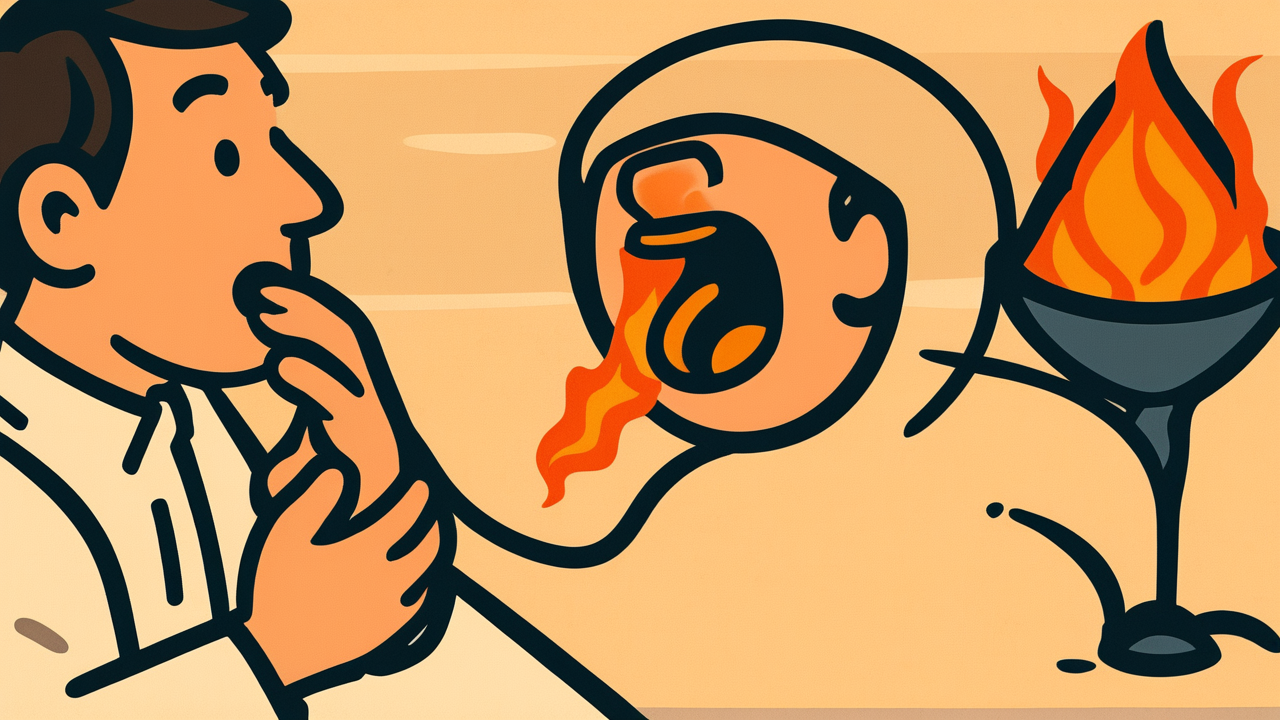How to Read “喉元過ぎれば熱さを忘れる”
Nodomoto sugi reba atsusa wo wasureru
Meaning of “喉元過ぎれば熱さを忘れる”
This proverb expresses the human tendency to completely forget the pain and lessons of difficult experiences and painful events once they have passed.
It is used in situations where someone vows “I’ll never overdo it again” while suffering from illness, but returns to their previous lifestyle once recovered, or reflects “I’ll be more careful next time” immediately after a major failure, but forgets that lesson over time and repeats the same mistake. This expression is used because the human ability to “forget” has both positive aspects and the dual nature of causing us to forget even important lessons. Even today, it is often used to point out people who become complacent after overcoming difficulties or situations where past experiences are not utilized.
Origin and Etymology
The origin of “Once throat passes, heat is forgotten” is thought to come from the natural human reaction when swallowing hot things. It is based on the everyday experience that when drinking hot soup or tea, the moment it passes through the throat is indeed hot and painful, but once swallowed, the memory of that heat quickly fades.
This proverb began appearing in literature from the Edo period and became established as an expression rooted in the daily lives of common people of that time. For people of the Edo period, hot soup and tea were part of their daily meals, familiar experiences that everyone had. Therefore, using this physical sensation to express human psychology was very easy to understand and gained empathy.
What is particularly interesting is that this proverb not only describes a mere physical phenomenon but is an expression that keenly observes the characteristics of human memory and emotions. The insight of our ancestors, who overlapped the psychological state of humans after pain and suffering have passed with the universally experienced act of “drinking something hot,” is truly admirable.
Usage Examples
- I thought I would absolutely quit investing at that time, but once throat passes, heat is forgotten, and I got involved again
- When I was sick, I keenly felt the importance of health, but as the saying goes “once throat passes, heat is forgotten,” after getting better, I started staying up late again
Modern Interpretation
In modern society, the meaning of this proverb has become more multi-layered. In our information society, we are exposed to vast amounts of information daily and must constantly direct our attention to new events. Therefore, the tendency to forget past lessons may be stronger than ever before.
Particularly due to the influence of social media and news media, society as a whole has become prone to falling into a state of “once throat passes, heat is forgotten.” When major disasters or incidents occur, everyone shows interest and advocates for the necessity of countermeasures, but as time passes, interest wanes and similar problems occur again frequently.
On the other hand, in modern times, the development of recording technology has made it easier to objectively preserve and reflect on past experiences and lessons. Information stored as digital data does not disappear even when human memory fades. An increasing number of companies are building systems that create databases of past failure cases to avoid repeating the same mistakes.
While this proverb represents a natural human psychological tendency, it teaches us that in modern society, it has become important to consciously confront this tendency and create mechanisms to not forget lessons.
When AI Hears This
Modern people are not trapped in a situation where they “forget too much,” but rather where they “cannot forget.” Social media timelines deliver a constant stream of “hot topics” from around the world, 24 hours a day. Scandals, disasters, incidents, controversies—it’s as if the next scalding liquid is poured into our mouths before we can even swallow what’s already burning our throats.
What’s fascinating is how this acceleration has fundamentally altered the human memory system. Neuroscientist Daniel Levitin reports that the amount of information modern people process daily has increased fivefold since 1986. In other words, our brains are constantly living with “something hot stuck in our throats.”
The result has been the emergence of a “fear of forgetting.” This manifests in behaviors like saving important news as screenshots or hoarding massive numbers of articles in read-later apps. Minor incidents that people in the Edo period would naturally forget, maintaining their peace of mind, are now permanently recorded in the digital ocean.
Ironically, the “ability to forget” has become a modern luxury. The popularity of digital detoxes and meditation apps represents desperate attempts by contemporary people to intentionally create a state where “once something passes the throat, its heat is forgotten.”
Lessons for Today
What this proverb teaches modern people is the importance of getting along well with the human characteristic of “forgetting.” Forgetting is not necessarily a bad thing. By allowing painful memories to fade, we can live positively.
What’s important is not to blame ourselves for forgetting, but to create mechanisms to consciously recall truly important lessons, assuming we have a tendency to forget. There are many ways to supplement memory: keeping a diary, setting aside regular time for reflection, talking to trusted people.
Also, when others are repeating the same mistakes, if we remember the proverb “once throat passes, heat is forgotten,” we can watch warmly rather than criticize harshly. The attitude of accepting human-like weaknesses while still trying to grow is the life wisdom this proverb teaches us. Even if we’re not perfect, even if we’re forgetful, that might be the endearing quality of being human.



Comments